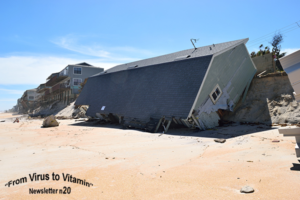OF Discussion Board n°20 – 24 September 2021
 Question asked : « Insurance companies play a key role in pricing, transferring and managing damage-related risks. Yet, in 2015, just before the UN Climate Change Conference (COP 21), the then CEO and Chairman of global insurance company AXA – Henri de Castries – warned that “a four degrees’ rise in global average temperature is not insurable.” According to Intergovernmental Panel on Climate Change (IPCC), we are today aiming at four degrees. In fact, De Castries poses the question of how uncertainty will be priced and mitigated in our world which is off track of net-zero greenhouse gas emission target. Would public authorities become by default the only available shelter against some risks, and what would this imply for financial markets, insurance companies and public finances?«
Question asked : « Insurance companies play a key role in pricing, transferring and managing damage-related risks. Yet, in 2015, just before the UN Climate Change Conference (COP 21), the then CEO and Chairman of global insurance company AXA – Henri de Castries – warned that “a four degrees’ rise in global average temperature is not insurable.” According to Intergovernmental Panel on Climate Change (IPCC), we are today aiming at four degrees. In fact, De Castries poses the question of how uncertainty will be priced and mitigated in our world which is off track of net-zero greenhouse gas emission target. Would public authorities become by default the only available shelter against some risks, and what would this imply for financial markets, insurance companies and public finances?«
Thanks for those of our contributors who ventured to react to the this question posed in this Discussion Board.
Editorial – Turning up the heat: can private insurance alone mitigate climate change damages?
by Virgile Perret & Paul H. Dembinski
|
As a consequence of climate change, extreme weather events such as floods, droughts, heat waves and storms have increased in frequency and severity. As recalled by Domingo Sugranyes: “global losses from natural disasters in 2020 came to US$ 210bn of which US$ 82bn was insured. To cover the gap and manage catastrophic risk accumulation, the role of insurance and reinsurance pools is key, often drawn by traumatic events themselves.” This being said, the gap of uninsured damages is huge, which means a growing burden on public budgets, but also directly on the most exposed and on the directly hit. These situations will impact access and credit conditions for these populations.
Insurers’ concerns are no longer individual catastrophic events but their global and systemic effects on human societies. Andrew Cornford explains, “the problems posed to insurers will be due to the increased scale of the actual occurrence of events associated with these risks, to their sometimes geographically uncertain incidence, and to increased correlations between them.” In Cornford’s view, “the resulting problems can, to some extent, be handled through better designed and increased capital requirements, public-sector reserves, and precautionary arrangements suggested by stress testing – for which recent experience with Covid-19 may be helpful.” However, the underlying hypothesis is that the level of premiums will remain affordable to those seeking cover.
Nevertheless, indeed increased property claims as a result of extreme weather events are forcing insurers to re-evaluate underwriting strategies, including rebalancing their premiums and pricing strategies. Against this background, regulators have expressed concern that climate change could make it increasingly difficult for insurance companies to provide affordable financial protection. Rising premiums could indeed make cover unaffordable, especially for the disadvantaged communities more likely to live in regions prone to disaster.
Rather than burdening local populations with additional costs of prospective damages that occur because of climate change generated largely by the wealthy North, there is urgency to work out international burden sharing underwriting strategies that would transfer a substantial portion of the climate related insurance costs from the South to the North. Otherwise, the most exposed regions of the world may well become impossible to insure by market mechanisms, which would leave only the public guarantee option open, as stressed by Etienne Perrot.
|
  |

| « … pass the cost to policyholders through increased insurance premiums … ”
Unlike randomness, which allows a probability calculation on a statistical basis, uncertainty arises from facts that are emerging, unique or too few to give rise to a stochastic calculation. Randomness is the basis of prevention and insurance systems. On the other hand, uncertainty can only be covered by contingency reserves, it’s a precaution. (The IPCC forecast, insurance’s prevention and precaution are the three forms of the virtue of prudence, which is the intelligence of concrete situations.) Henri de Castries therefore hypothesizes that the damaging meteorological phenomena induced by a global warming of four degrees are phenomena, if not unique, at least too few to enter into an insurance system. This involves the States, either directly when they compensate for the damage by compulsory levies (in France, we have known “the drought tax” in the 1980s) or by obliging the insurance companies to compensate the damage, which will pass the cost on to policyholders through increased insurance premiums.
Etienne Perrot
Jesuit, Dr. Economics sciences, editorial board of the magazine Choisir (Geneva), editorial adviser of the journal Études (Paris)
|
 |
| « … public-private partnerships can be developed …”
According to Munich Re, global losses from natural disasters in 2020 came to US$ 210bn of which US$ 82bn was insured. To cover the gap and manage catastrophic risk accumulation, the role of insurance and reinsurance pools is key, often drawn by traumatic events themselves. Public-private partnerships are nothing new (eg US National Flood Insurance or the Spanish Consorcio) and can be developed. Insurance plays an essential role towards mitigating damage from climate change through underwriting, prevention, disseminating knowledge and as investors. Large players have recently committed to the UN-convened Net-Zero Insurance Alliance (July 2021). Artificial Intelligence and big data analysis research, also supported by insurance, will increase natural disaster predictability. Insurance and reinsurance markets are efficient, though unpretentious!
Domingo Sugranyes
Director of a seminar on ethics and technology at Pablo VI Foundation, past Executive Vice-Chairman of MAPFRE international insurance group
|
 |
| « … capital requirements, public-sector reserves, and precautionary arrangements … ”
Individually most of the risks associated with a substantial rise in temperature due to climate change can be quantified owing to past experience. The problems posed to insurers, other private financial institutions, and the public sector will be due to the increased – and sometimes unpredictably increased – scale of the actual occurrence of events associated with these risks, to their sometimes geographically uncertain incidence, and to increased correlations between them. To some extent the resulting problems can be handled through better designed and increased capital requirements, public-sector reserves, and precautionary arrangements suggested by stress testing – for which recent experience with Covid-19 may be helpful. These arrangements will entail institutional innovations, training of people to handle the consequences of the new risks, and enhanced multilateral cooperation, the absence of any of which will reduce the effectiveness of the potential contribution of finance to control of damages and mitigation of their effects.
Andrew Cornford
Counsellor, Observatoire de la Finance; past staff member of UNCTAD, with special responsibility for financial regulation and international trade in financial services
|
 |
 Question asked : « Insurance companies play a key role in pricing, transferring and managing damage-related risks. Yet, in 2015, just before the UN Climate Change Conference (COP 21), the then CEO and Chairman of global insurance company AXA – Henri de Castries – warned that “a four degrees’ rise in global average temperature is not insurable.” According to Intergovernmental Panel on Climate Change (IPCC), we are today aiming at four degrees. In fact, De Castries poses the question of how uncertainty will be priced and mitigated in our world which is off track of net-zero greenhouse gas emission target. Would public authorities become by default the only available shelter against some risks, and what would this imply for financial markets, insurance companies and public finances?«
Question asked : « Insurance companies play a key role in pricing, transferring and managing damage-related risks. Yet, in 2015, just before the UN Climate Change Conference (COP 21), the then CEO and Chairman of global insurance company AXA – Henri de Castries – warned that “a four degrees’ rise in global average temperature is not insurable.” According to Intergovernmental Panel on Climate Change (IPCC), we are today aiming at four degrees. In fact, De Castries poses the question of how uncertainty will be priced and mitigated in our world which is off track of net-zero greenhouse gas emission target. Would public authorities become by default the only available shelter against some risks, and what would this imply for financial markets, insurance companies and public finances?« 





